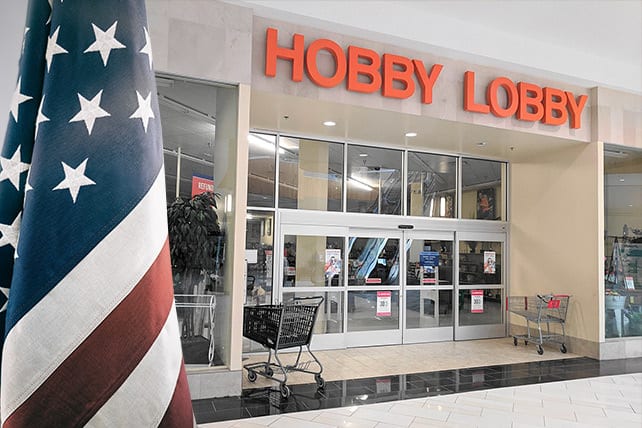Popular arts and crafts chain Hobby Lobby has generated an uproar for an ad it ran on the Fourth of July. The Hobby Lobby ad featured the text, “One Nation Under God,” quoted Psalm 33:12, and gave various examples from American history to support the idea that the United States is a Christian nation.
“The July 4th ad features the American flag and Psalm 33:12, ‘Blessed is the nation whose God is the Lord,’” said the company in an announcement on its website. “The full ad includes quotes from former presidents, Supreme Court justices, Founding Fathers, Congress and others. Each quote emphasizes the relevance of God and the Bible in the fabric of American life.”
“Blessed is the nation whose God is the Lord.” – Psalm 33:12 https://t.co/wxCmPuRq1D pic.twitter.com/yIoZU7326z
— Official Hobby Lobby (@HobbyLobby) July 4, 2021
Hobby Lobby president Steve Green said, “These ads don’t include sale items or special pricing. We just want to let people know that we love our Lord, and we love our country.”
Hobby Lobby Ad Gets Backlash
Hobby Lobby posted a downloadable PDF of the ad on its website, posted the it to social media, and ran it in newspapers throughout the country. Among its other quotes and examples, the Hobby Lobby ad features examples from two Supreme Court cases to support the idea that the U.S. is a Christian nation. One case, Church of the Holy Trinity v. United States (1892) was a “unanimous decision declaring America a Christian nation,” says the ad. The Hobby Lobby ad says that another case, Vidal v. Girard’s Executors (1844) was a “unanimous decision commending and encouraging the use of the Bible in government-run schools.”
At the bottom of the Hobby Lobby ad are a link where people can request a free Bible and a link where people can learn more about how to trust in Jesus as their savior.
In an explanation of holiday messages on its website, Hobby Lobby says that in the Christmas of 1995, company founder and CEO David Green “was reading the Christmas advertisements, including those for his own store, and he felt commissioned by God to do something different. Hobby Lobby was selling all kinds of crafts that customers used to celebrate Christmas, yet David Green was struck by the lack of any testimony in newspapers regarding the meaning of the holiday.”
Green decided to create an ad for Christmas 1996 that encouraged people to seek out a “Bible-believing church” and “discover a relationship this Christmas with the God who loves you more than you can begin to imagine.”
“Before long,” says the site, “Hobby Lobby was placing beautiful full-page ads celebrating the real meaning of Christmas, Easter and Independence Day in newspapers across the country.”
On social media, people responded to the Hobby Lobby ad with both praise and criticism. “Thank you Hobby Lobby for the encouraging WORD,” said one Twitter user. “May the Lord bless you and all your employees and their families and cause you to prosper and continue to be a bright light in this dark community. And GOD BLESS AMERICA!”
Another said, “Separation of church and state. Because you insist on shoving religion down our throats, I shop at Joann’s [sic] and Michael’s, even though your store is closer.” A user named Claire said, “Geez I thought the founding fathers were all for that freedom of religion thing??? You know NOT telling people which religion they can practice and SEPARATION OF CHURCH & STATE! I’m a Christian and I don’t expect everyone to fall in step with me. WWJD…”
Several people alluded to the controversy Hobby Lobby has recently faced for having purchased stolen biblical artifacts. Said one user, “Here’s a quote for you: Thou shalt not steal. Exodus 20:15.”
The Freedom From Religion Foundation (FFRF) called the Hobby Lobby ad “propaganda.” FFRF is a nonprofit that exists to “promote the constitutional principle of separation of state and church, and to educate the public on matters relating to nontheism.”
FFRF is calling for a boycott of Hobby Lobby and ran its own Fourth of July ad as a direct response to Hobby Lobby’s. The FFRF ad is called “In Hobby Lobby We DON’T Trust.” It takes quotes directly from the Hobby Lobby ad and explains them in context, while also linking to the original documents and other information to give the quotes a broader frame of reference.

